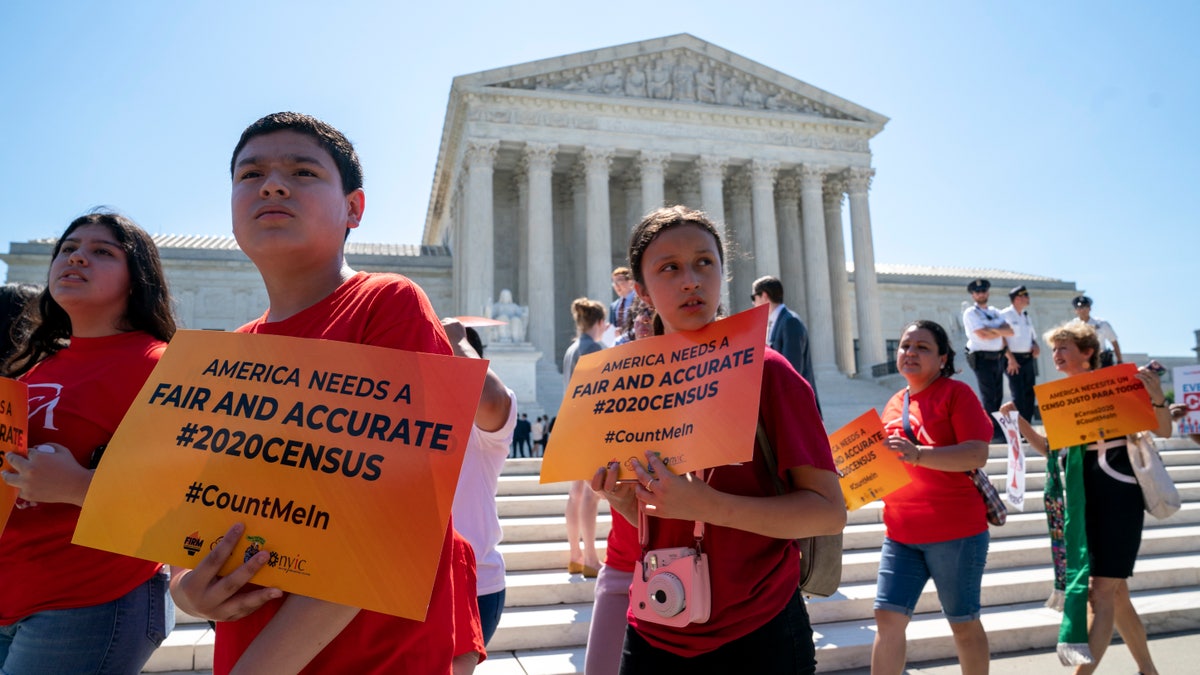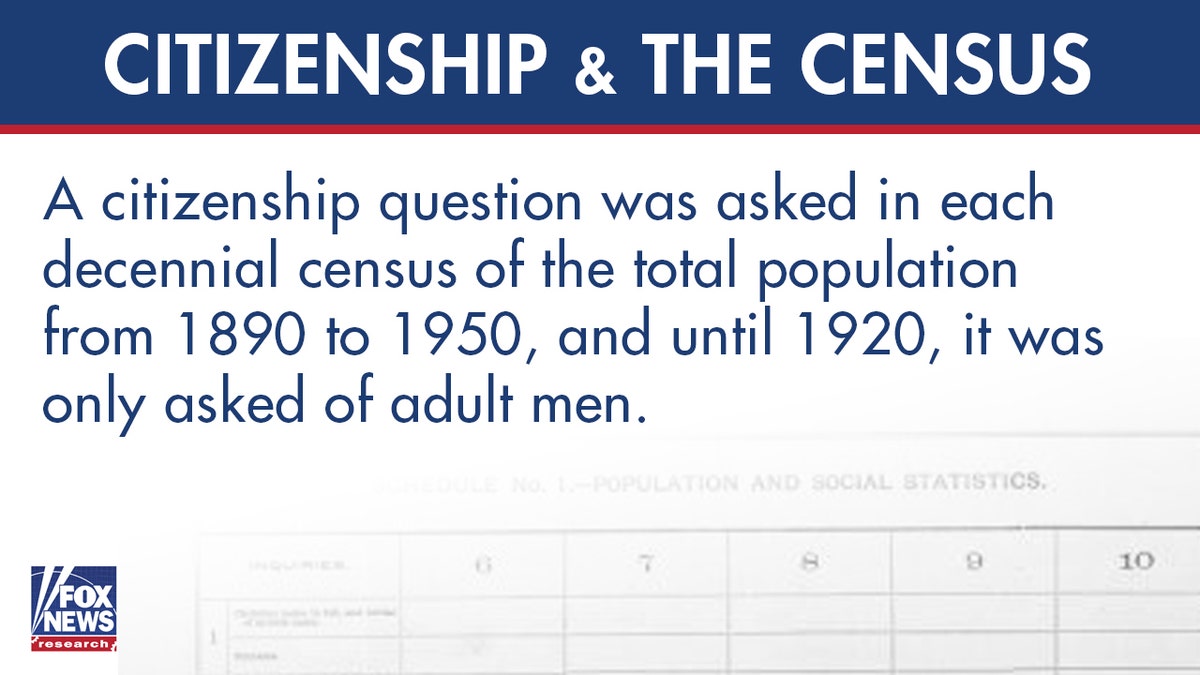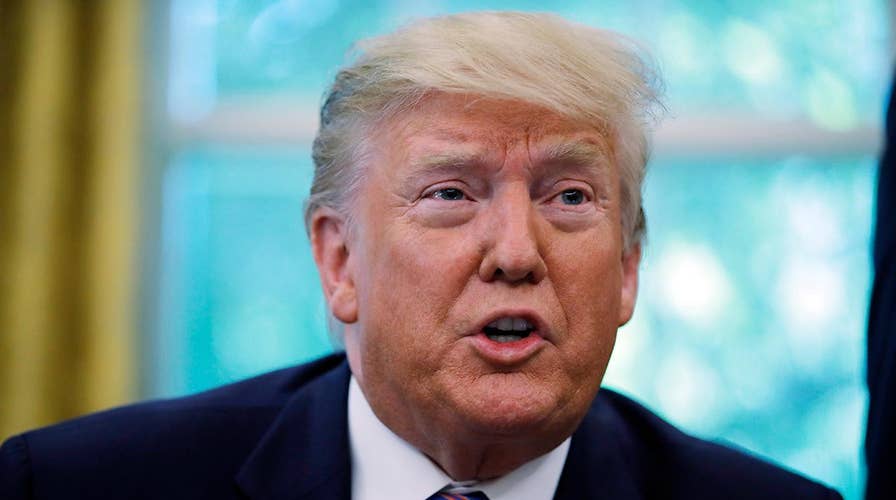Trump administration abandons census citizenship question
The Justice Department announces that it will proceed without the planned question on citizenship on the 2020 census; Kevin Corke reports from the White House.
The New York attorney general’s office said Tuesday the Justice Department has decided to print the 2020 Census without the citizenship question sought by the Trump administration, ending a contentious legal dispute over an issue that could soon affect the makeup of Congress and the Electoral College.
The Supreme Court ruled last week that the question couldn't be added for now, but left open the possibility that additional arguments could change its mind. Civil rights groups argued that the Trump administration's reasons for including the question were merely pretextual efforts to discourage illegal immigrants from responding to the Census.
Population counts from the Census are used to apportion House seats among the 50 states, and a new electoral map based on the Census will be in effect for the 2024 presidential election. States receive votes in the Electoral College equal to the number of members in their congressional delegation, counting both House and Senate seats.
In a tweet on Monday, Daniel Jacobson, who worked in the White House Counsel’s Office under President Obama, said a trial attorney at the Justice Department told him that "the printer has been instructed to begin the printing process" without the citizenship question.
"We won," Jacobson wrote.
In a statement to Fox News, Commerce Secretary Wilbur Ross tied the decision to the Supreme Court's ruling.
“I respect the Supreme Court but strongly disagree with its ruling regarding my decision to reinstate a citizenship question on the 2020 Census," Ross said. "The Census Bureau has started the process of printing the decennial questionnaires without the question. My focus, and that of the Bureau and the entire Department is to conduct a complete and accurate census.”
For his part, House Oversight Committee Chairman Elijah Cummings, D-Md., issued a less-than-celebratory statement calling for answers, even as he praised the decision to scrap the citizenship question.
"I am encouraged that Administration officials dropped President Trump’s unconstitutional plan to postpone the Census just because he lost the Supreme Court case," Cummings said. "The Trump Administration put our country through more than a year of wasted time and squandered resources—all in the service of an illegal attempt to add a discriminatory question based on a pretext."
Cummings continued: "The Attorney General and the Secretary of Commerce must now turn over all of the documents our Committee has subpoenaed on a bipartisan basis."
Senate Minority Leader Chuck Schumer, D-N.Y, added, "The exclusion of the citizenship question from the census is a victory for our democracy and for fair representation of all communities in this country."
President Trump had tweeted that he had asked lawyers if the count can be delayed until the Supreme Court can reevaluate the matter, based on additional evidence supporting the administration's justifications for adding the citizenship question.

Young demonstrators gather at the Supreme Court as the justices finish the term with key decisions on gerrymandering and a census case involving an attempt by the Trump administration to ask everyone about their citizenship status in the 2020 census, on Capitol Hill in Washington, Thursday, June 27, 2019. (AP Photo/J. Scott Applewhite)
The Supreme Court, in its ruling last week, did not prohibit a citizenship question out of hand but dismissed the administration's provided rationale as insufficient.
However, Kristen Clarke, president and executive director of the Lawyers’ Committee for Civil Rights Under Law, told Fox News on Tuesday that the Supreme Court was unlikely to change its mind. Clarke's team successfully challenged the Trump administration on the use of the citizenship question in federal court in California, and was one of several groups to bring such lawsuits.
“The Supreme Court’s ruling left little opportunity for the administration to cure the defects with its decision to add a citizenship question and, most importantly, they were simply out of time given the impending deadline for printing forms," Clarke said.
Experts agreed that any delay could gum up the U.S. Census Bureau's finely calibrated timetable for the 10-year count. Monday was the deadline to start printing the 600 million documents that will be mailed to 130 million households for next April's census count.
CAL THOMAS: CENSORING THE CENSUS IS ABOUT POLITICS, NOT THE LAW
For months, the Trump administration had argued that the courts needed to decide quickly whether the citizenship question could be added to the 2020 census because of the looming deadline.
"I think it's very important to find out if somebody is a citizen as opposed to an illegal," Trump told reporters Monday. "There's a big difference to me between being a citizen of the United States and being an illegal."

Former President Barack Obama's administration didn't ask the citizenship question in the 2010 census. The citizenship question was last asked on the census in 1950, but beginning in 1970, a citizenship question was asked in a long-form questionnaire sent to a relatively small number of households, alongside the main census. In 2010, there was no long-form questionnaire.
"There is no credible argument to be made that asking about citizenship subverts the Constitution and federal law," Chapman University law professor and constitutional law expert John Eastman told Fox News.
From a logistical standpoint, any delay "would be a nightmare," said John Thompson, who served as Census Bureau director during Obama's second term.
The bureau already has been in the process of signing almost 250 office leases across the U.S. and has hired 1,500 specialists partnering with community organizations to encourage people to participate in the census. More than 170,000 recruits already have filled out applications for the almost half-million positions being created for the count. The bureau has helped set up more than 1,500 committees nationwide working to get everyone to respond.
Furthermore, Congress would have to change the law for the count to be delayed because Title 13 of the U.S. Code mandates that it take place on April 1, 2020, Thompson said.
"I don't think there's any ambiguity, but I'm not a lawyer," Thompson said.
Fewer people are expected to fill out the questionnaires using paper than in years past because the bureau for the first time is relying on most respondents to use the Internet to answer questions. Still, printed postcards and letters are to be sent out next March reminding residents it's time to answer the questionnaire, and those who don't respond digitally are expected to be mailed paper questionnaires.
As recently as last week, the Trump administration's solicitor general wrote in court papers that the Census Bureau needed to finalize the questions by June. Any changes to the paper questionnaire after June would impair the bureau's ability to conduct the count in a timely manner, wrote the solicitor general, Noel Francisco.
More than two dozen Democrats in the U.S. Senate last week sent a letter urging Ross to drop any further pursuit of the citizenship question because it would delay the bureau's ability to conduct the count.
"The 2020 Census is less than half a year away, and any unnecessary delay in operations would impact the ability of the Census Bureau to count every person in our country," the letter read.
CLICK HERE TO GET THE FOX NEWS APP
This past May, Montana Republican Sen. Steve Daines introduced legislation that would require the census to include a citizenship question.
"This is America," Daines told Fox News at the time. "We are a sovereign nation. It's absurd that we don't know how many citizens and non-citizens are living in this country. That's why I'm introducing this bill to require a citizenship question on the census - and ensure that states harboring millions of illegal immigrants are not rewarded with additional taxpayer dollars."
Fox News' Jake Gibson, Sally Persons and The Associated Press contributed to this report.






















